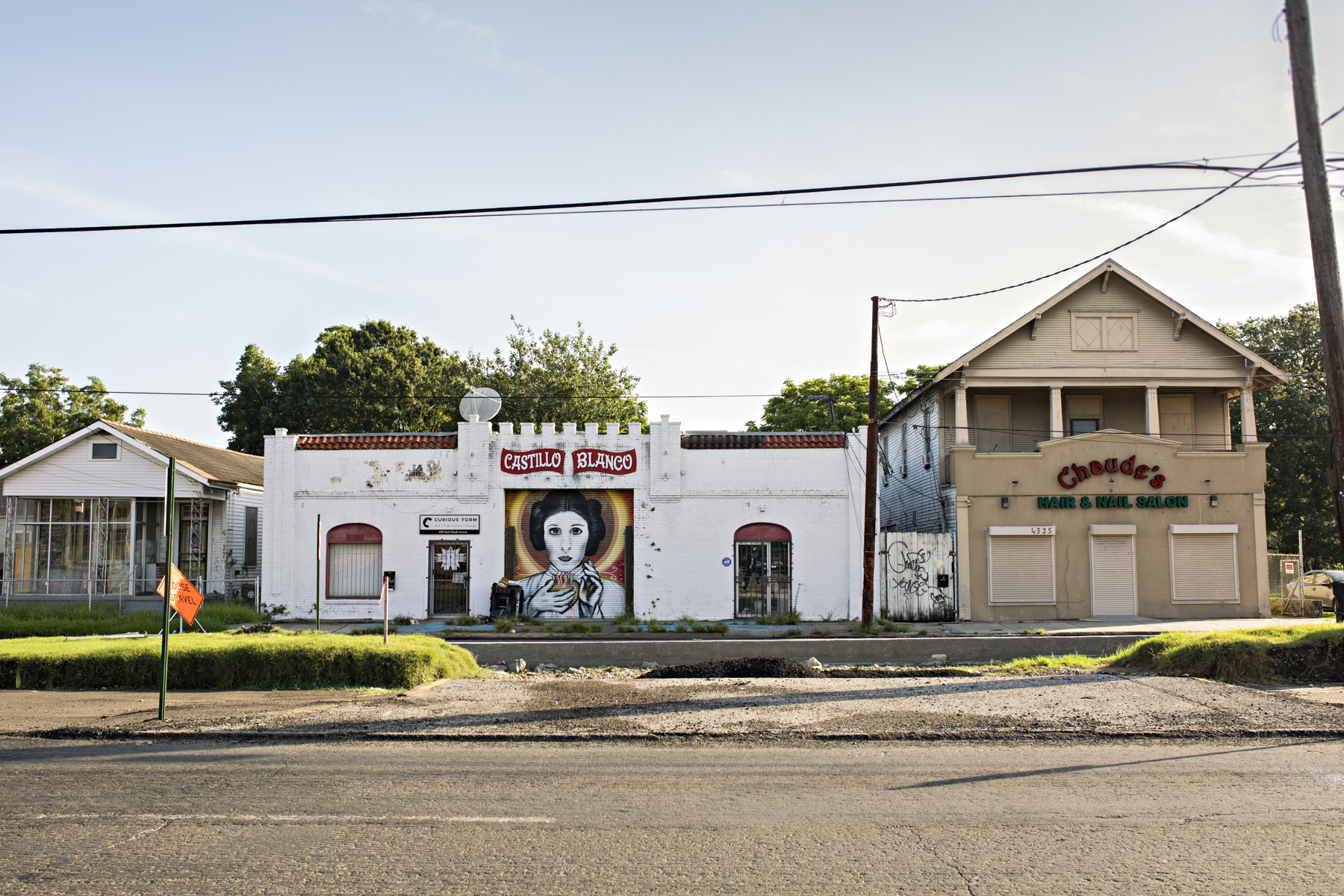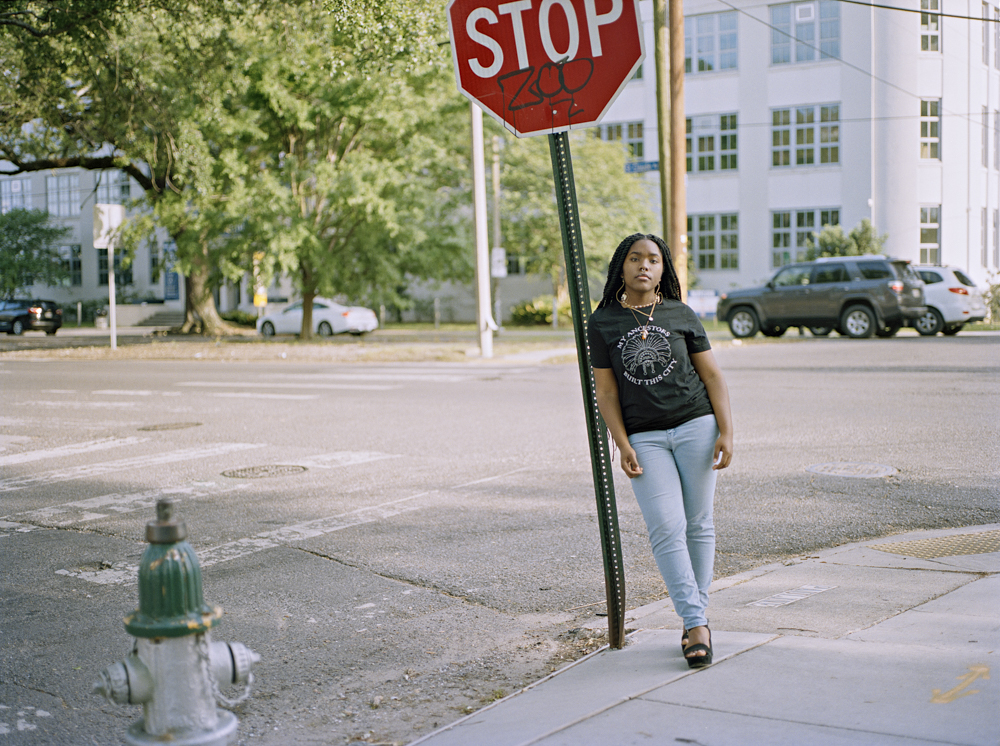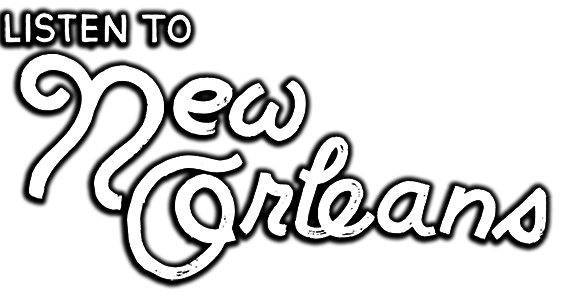“It is a fight for higher ground, literally”

I'm Akilah Toney. I'm from New Orleans, Louisiana, the Ninth Ward, New Orleans East, and I am a poet, writer, dancer, and all around creator.
As a kid in my head, I always imagined the Super 10 on 4321 St. Claude Avenue, looking like a castle, like a white castle. A very nostalgic memory because my sister, my mom, and I, we used to go there and get like little knickknacks and shop there. It really captures how in particular my family, my parents, like we wasn't balling, we wasn't rich, but they always made sure we got what we needed. It's something that kind of hits my heart and I thought I'd be like, okay, gentrification is happening. But it's like, ugh, every time you wake up and you go out into the city, like something is different, so it's this constant reckoning with knowing that something is not going to be here anymore.
And a lot of times it started out with murals. I love art, but I think ultimately artists have the responsibility to say “Okay, if it's going to be in a public place like this neighborhood, what purpose is it going to serve? Who is it going to represent? And, what is it going to be in conversation with within the neighborhood?”
I think that's just white folks not knowing what's going on, and don't care to know what's going on. And so, they going to do what they want. Cause when you speak to people about gentrification, that's what I've heard from like a lot of white folks, like, “Oh, I just, I didn't know.” And I think, you know, how much of a privilege it is to move onto a piece of land, to move to a space and be so oblivious and unknowing to the things that go on in the neighborhood and just live there. So you know how they say ignorance is bliss? Whiteness is bliss. I think with gentrification in the city, it's this oblivious nature of it that's so harmful, that not knowing or willingness to not find out, is so dangerous and so destructive. This idea of living in this bliss of like,"Oh, New Orleans, I love the city,” but you just go out and harm all of these things.
When you look at the Bywater, the sediment deposits are higher cause it is closer to the river. So really the Bywater sits up higher than a lot of parts of the city. So when you think about it in an environmental sense, this idea of displacement, it is a fight for higher ground, literally.
I know in the past, the city government made billions of dollars from the tourism industry. So do you really think they were wanting to do something about the Airbnbs? You know, it might not be working for us, may not be working for residents of color, might not be working for Black folks, you know, Vietnamese, poor folks living in New Orleans, but it's working for the pockets of the city.
I feel like I have a different perspective because I'm from the East right, but there wasn't a school I could go to, cause I mean, even now the East looks like Hurricane Katrina [just happened]. Just like so much of the East has not been rebuilt. Like really people don't consider the East, when they think about New Orleans. I feel like people don't even know it exists. So I went up to Drew around the Bywater and then it changed to Arise Academy.
So Drew Elementary was a Black school. I remember being in that school and a lady coming in, and she was telling us like, there's some people coming to look at the school, they're going to take over the school. And it's like, “What's going on?” So it kind of slowly trickled. Less and less Black teachers and it became more white teachers, more white transplant teachers, transplant principals, and just a drastically different school. And these are teachers who haven't interacted with the land or the history. They don't know the kids, they don't know the experiences of the kids and what they go through. So how can you expect somebody to have compassion for something they've never experienced or never took time to learn in particular?
I used to want to go to Warren Easton and McMain, you know, in high school, cause I love the culture of New Orleans and I just wanted to be like immersed in a Black school, but you know, different areas of the city, different opportunities, you know, NOCCA Bywater. I mean, I can say when DJ Jubilee say "What's the name of your school?", I can say,"Live Oak!" Cause that was my pre-K school. It doesn't exist anymore, but I don't have that attachment to high school in the way that my older, local New Orleanians might have. I don't have that. It's not as strong. I can hear about it. I can have that ancestral memory of it. I could hear about it in a song or, you know, a laugh with my auntie and my uncles about, you know, the culture of New Orleans schools, but I don't have that, because of the way charter schools came in and changed everything.
When you think about the original purpose of this land, Bulbancha, you know, it was known as a place where different Indigenous groups could trade. It's something [that] I think, is still present. This idea of collective memory and collective exchange and conjuring of new cultural identities that have come up within the city of New Orleans. So I definitely think those memories of Bulbancha and those memories that Black families have held on to. I think it's what keeps the city afloat literally, cause New Orleans wouldn't be what it is, if it wasn't for the memories of Black folks, if it wasn't for the memories of Indigenous folks, Black Indigenous folks.
So the Super 10, whatever it's little store, but I think it reflects a larger part of my emotions surrounding this neighborhood and this idea of New Orleans having like the essence of a mother. You know it's there to take [from], it's there for you to have fun, to drink and to party and to learn about the culture and you see Black people be themselves and perform on the street and you have fun with them and eat their dishes and all of this stuff. But, what happens when you take from the land, but you don't really give anything back?
![]()
Akilah Toney on St. Claude Avenue, 2021As a kid in my head, I always imagined the Super 10 on 4321 St. Claude Avenue, looking like a castle, like a white castle. A very nostalgic memory because my sister, my mom, and I, we used to go there and get like little knickknacks and shop there. It really captures how in particular my family, my parents, like we wasn't balling, we wasn't rich, but they always made sure we got what we needed. It's something that kind of hits my heart and I thought I'd be like, okay, gentrification is happening. But it's like, ugh, every time you wake up and you go out into the city, like something is different, so it's this constant reckoning with knowing that something is not going to be here anymore.
And a lot of times it started out with murals. I love art, but I think ultimately artists have the responsibility to say “Okay, if it's going to be in a public place like this neighborhood, what purpose is it going to serve? Who is it going to represent? And, what is it going to be in conversation with within the neighborhood?”
I think that's just white folks not knowing what's going on, and don't care to know what's going on. And so, they going to do what they want. Cause when you speak to people about gentrification, that's what I've heard from like a lot of white folks, like, “Oh, I just, I didn't know.” And I think, you know, how much of a privilege it is to move onto a piece of land, to move to a space and be so oblivious and unknowing to the things that go on in the neighborhood and just live there. So you know how they say ignorance is bliss? Whiteness is bliss. I think with gentrification in the city, it's this oblivious nature of it that's so harmful, that not knowing or willingness to not find out, is so dangerous and so destructive. This idea of living in this bliss of like,"Oh, New Orleans, I love the city,” but you just go out and harm all of these things.
When you look at the Bywater, the sediment deposits are higher cause it is closer to the river. So really the Bywater sits up higher than a lot of parts of the city. So when you think about it in an environmental sense, this idea of displacement, it is a fight for higher ground, literally.
I know in the past, the city government made billions of dollars from the tourism industry. So do you really think they were wanting to do something about the Airbnbs? You know, it might not be working for us, may not be working for residents of color, might not be working for Black folks, you know, Vietnamese, poor folks living in New Orleans, but it's working for the pockets of the city.
I feel like I have a different perspective because I'm from the East right, but there wasn't a school I could go to, cause I mean, even now the East looks like Hurricane Katrina [just happened]. Just like so much of the East has not been rebuilt. Like really people don't consider the East, when they think about New Orleans. I feel like people don't even know it exists. So I went up to Drew around the Bywater and then it changed to Arise Academy.
So Drew Elementary was a Black school. I remember being in that school and a lady coming in, and she was telling us like, there's some people coming to look at the school, they're going to take over the school. And it's like, “What's going on?” So it kind of slowly trickled. Less and less Black teachers and it became more white teachers, more white transplant teachers, transplant principals, and just a drastically different school. And these are teachers who haven't interacted with the land or the history. They don't know the kids, they don't know the experiences of the kids and what they go through. So how can you expect somebody to have compassion for something they've never experienced or never took time to learn in particular?
I used to want to go to Warren Easton and McMain, you know, in high school, cause I love the culture of New Orleans and I just wanted to be like immersed in a Black school, but you know, different areas of the city, different opportunities, you know, NOCCA Bywater. I mean, I can say when DJ Jubilee say "What's the name of your school?", I can say,"Live Oak!" Cause that was my pre-K school. It doesn't exist anymore, but I don't have that attachment to high school in the way that my older, local New Orleanians might have. I don't have that. It's not as strong. I can hear about it. I can have that ancestral memory of it. I could hear about it in a song or, you know, a laugh with my auntie and my uncles about, you know, the culture of New Orleans schools, but I don't have that, because of the way charter schools came in and changed everything.
When you think about the original purpose of this land, Bulbancha, you know, it was known as a place where different Indigenous groups could trade. It's something [that] I think, is still present. This idea of collective memory and collective exchange and conjuring of new cultural identities that have come up within the city of New Orleans. So I definitely think those memories of Bulbancha and those memories that Black families have held on to. I think it's what keeps the city afloat literally, cause New Orleans wouldn't be what it is, if it wasn't for the memories of Black folks, if it wasn't for the memories of Indigenous folks, Black Indigenous folks.
So the Super 10, whatever it's little store, but I think it reflects a larger part of my emotions surrounding this neighborhood and this idea of New Orleans having like the essence of a mother. You know it's there to take [from], it's there for you to have fun, to drink and to party and to learn about the culture and you see Black people be themselves and perform on the street and you have fun with them and eat their dishes and all of this stuff. But, what happens when you take from the land, but you don't really give anything back?

(photo: Sarrah Danziger)
